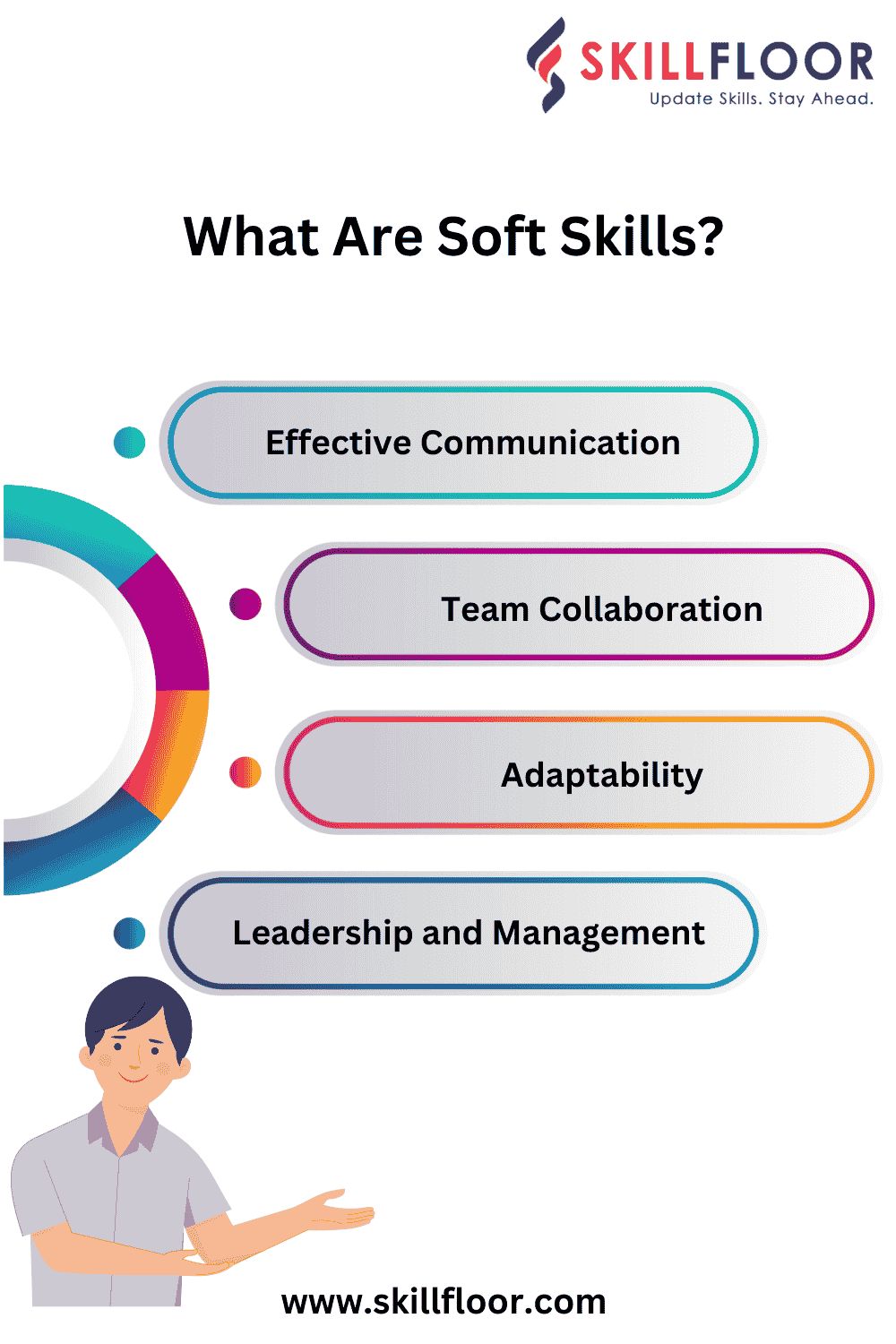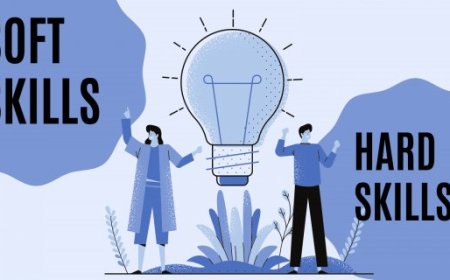The Crucial Role of Soft Skills for Working Professionals
Explore the pivotal role of soft skills in the professional realm. Understand why employers value interpersonal attributes like communication, teamwork, and adaptability.

In the current professional scene, succeeding solely on technical proficiency is inadequate. Employers now value soft skills and interpersonal abilities that facilitate effective communication, collaboration, and professionalism. Soft skills, including adaptability and emotional intelligence, are increasingly acknowledged as integral to workplace success. In this competitive environment, professionals must recognize the importance of blending technical expertise with strong interpersonal skills to thrive in their careers and contribute positively to collaborative work environments.
What Are Soft Skills?
Soft skills are non-technical, interpersonal talents that improve an individual's productivity at work. These consist of emotional intelligence, emotional intelligence, teamwork, and communication. Soft skills, as opposed to hard or technical abilities, are essentially people-oriented and have an impact on how people communicate and work together. Soft skills are crucial for success in a variety of professional contexts. They support pleasant relationships, successful communication, and the capacity to negotiate tricky social situations, all of which help to create a cooperative and productive work atmosphere.
The Power of Soft Skills in Modern Workplaces
Professionals with strong soft skills in addition to technical expertise are in more demand in today's workplace. Employers respect workers who can traverse social difficulties and contribute productively to varied teams through good communication. Soft skills like emotional intelligence, communication, teamwork, and adaptability are essential for establishing trust and encouraging cooperation. A comprehensive skill set is becoming more and more necessary to succeed in the fast-paced, team-oriented modern workplace.
Balancing Technical Proficiency and Interpersonal Skills for Career Success
While technical skills are important, strong soft skills are much more beneficial. Some experts make the error of placing too much emphasis on technical proficiency while undervaluing the importance of interpersonal skills. This omission might hinder job advancement because successful teamwork and communication are essential for success in the workplace. Acknowledging the mutual benefit of technical and soft abilities is crucial for a more well-rounded and all-encompassing approach to professional growth. Stressing both facets improves one's capacity to negotiate the intricacies of the contemporary workplace and make a significant contribution to group projects.
Why are soft skills increasingly becoming a focal point for employers, and how can working professionals ensure they are not overlooking these vital attributes in their career development?
Soft skills play a pivotal role in determining an individual's success in the workplace. Beyond the technical know-how, employers value professionals who can communicate clearly, collaborate seamlessly, and adapt to changing circumstances. Here are some reasons why soft skills are of paramount importance for working professionals:

1. Effective Communication
-
Clear and concise communication is key to avoiding misunderstandings and ensuring that tasks are completed accurately and efficiently.
-
Professionals with strong communication skills can convey complex ideas in a way that is easily understood by team members, clients, and stakeholders.
2. Team Collaboration
-
Success in today's collaborative work environments relies heavily on one's ability to work effectively within a team.
-
Soft skills such as teamwork, empathy, and conflict resolution contribute to a positive team dynamic, fostering creativity and innovation.
3. Adaptability
-
The business scenery is constantly changing, and professionals need to be adaptable to stay relevant.
-
Soft skills like adaptability and resilience enable individuals to traverse challenges, embrace change, and thrive in dynamic work environments.
4. Emotional Intelligence
-
Understanding and managing one's own emotions, as well as being attuned to the emotions of others, is crucial for building strong interpersonal relationships.
-
Professionals with high emotional intelligence are better equipped to handle workplace conflicts and build a positive work culture.
5. Client and Customer Relations
-
For professionals in client-facing roles, soft skills are especially important. Building rapport, understanding client needs, and effectively communicating solutions contribute to successful client relationships.
-
Strong interpersonal skills enhance a professional's ability to provide excellent customer service, leading to client satisfaction and potential business growth.
6. Leadership and Management
-
Soft skills are vital for leadership and management roles. Leaders need to inspire and motivate their teams, communicate a compelling vision, and foster a positive work culture.
-
Effective leadership relies on soft skills such as communication, empathy, and conflict resolution to guide teams toward common objectives.
How to Get Soft Skills
Developing soft skills is an ongoing process that involves self-awareness, intentional practice, and a commitment to continuous improvement. Unlike technical skills, which are often acquired through formal education and training, soft skills are cultivated through various experiences and conscious efforts. Here are some strategies to help you acquire and enhance your soft skills:
1. Self-Assessment
Begin by identifying the soft skills you currently possess and those you need to improve. Reflect on your strengths and areas for growth. This self-awareness is a crucial first step in the development process.
2. Set Clear Goals
Establish specific and achievable goals for enhancing your soft skills. Whether it's improving communication, teamwork, or adaptability, having clear objectives provides a roadmap for your development journey.
3. Seek Feedback
Actively seek feedback from colleagues, supervisors, or mentors. Constructive feedback can offer valuable insights into areas where you excel and areas that may need improvement. Be open to receiving feedback and use it as a guide for refining your soft skills.
4. Learn from Others
Observe and learn from individuals who demonstrate strong soft skills. Identify role models in your workplace or industry and pay attention to how they communicate, collaborate, and travel around challenging situations. Use their behavior as inspiration for your development.
Top soft skills list
Adaptability
The ability to adapt to new situations, technologies, and challenges is invaluable. Professionals who can embrace change and traverse uncertainty are more likely to thrive in today's fast-paced business environment.
Resilience
Resilience is the capacity to bounce back from setbacks and maintain a positive attitude in the face of adversity. This soft skill is essential for maintaining mental well-being and sustaining productivity, especially in high-pressure work environments.
Emotional Intelligence
Understanding and managing one's own emotions, as well as being attuned to the emotions of others, is critical for effective communication and collaboration. Emotional intelligence fosters strong interpersonal relationships and enhances overall team dynamics.
Remote Collaboration
With the rise of remote and hybrid work models, the ability to collaborate effectively in virtual settings has become a vital soft skill. Professionals need to master virtual communication tools, demonstrate accountability, and maintain productivity outside traditional office environments.
Digital Literacy
As technology continues to advance, digital literacy has become a fundamental soft skill. This includes proficiency with digital tools, the ability to traverse online platforms, and a general understanding of emerging technologies relevant to one's field.
Creativity and Innovation
Creativity is no longer confined to artistic endeavors; it is a critical soft skill in problem-solving and driving innovation. Professionals who can think outside the box, generate new ideas, and approach challenges with creativity contribute significantly to organizational success.
Refer to these blogs:-
The Impact of Soft Skills on Digital Marketing Strategies
Exploring Types of Soft Skills and Their Impact
Understand The Difference Between Soft Skills Vs. Hard Skills
Combining strong soft skills with technical proficiency is essential for negotiating the complexity of today's work environment. Emotional intelligence, cooperation, flexibility, and effective communication are not only desirable qualities; they are essential for success in collaborative work environments. Working professionals need to understand the value of these interpersonal skills and actively develop them to secure long-term career progress and make valuable contributions to their teams and organizations since employers are placing an increasing emphasis on them.






























































